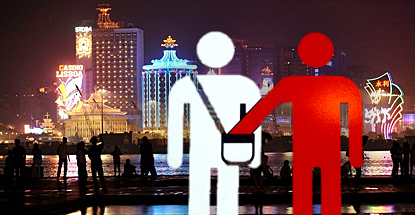 Macau casino operators will take some solace in the news that visitor rates will continue to grow in the single-digits for the next few years. The day after Macau casinos reported their third straight month of revenue decline, Macau Government Tourist Office director Maria Helena de Senna Fernandes told reporters she’s “prudently optimistic” that Macau’s growth isn’t over just yet.
Macau casino operators will take some solace in the news that visitor rates will continue to grow in the single-digits for the next few years. The day after Macau casinos reported their third straight month of revenue decline, Macau Government Tourist Office director Maria Helena de Senna Fernandes told reporters she’s “prudently optimistic” that Macau’s growth isn’t over just yet.
Tourist arrivals to the world’s top gambling hub grew 4.4% to 29.3m in 2013, rebounding from flat growth in 2012. Over the first seven months of 2014, Macau has welcomed 18m visitor arrivals, up 8% over the same period last year, although newly imposed transit visa restrictions may curb growth in H2. Macau International Airport arrivals are up even higher, rising 10% to 3.6m as visitors beyond neighboring Guangdong province make the pilgrimage to Macau. The number of hotel guests is up 2% year-on-year to 6.2m.
As tourists are still flocking to Macau, more blame for the revenue downturn gets pinned on VIP gamblers, who are either not showing up or gambling less when they do. China’s ongoing war against corruption turned another page last week when Beijing Youth Daily reported that some government agencies were requiring staff to turn in their passports.
Credit Suisse analyst Kenneth Fong said these pulled passports wouldn’t do that much direct damage to Macau, as the officials already had to jump through hoops in order to obtain a visa. Regardless, it sends a message to the private sector that Beijing isn’t letting up.
Macau is also facing increased regional competition for international VIPs, with new or expanding projects springing up in Australia, the Philippines, South Korea, Cambodia, Vietnam, Russia and (eventually) Japan. Investment bankers UBS issued a report this week saying these jurisdictions could generate VIP revenue of MOP 8.8b (US $1.1b) in 2015, most of it diverted from Macau, which would see VIP revenue shrink between four and five percent.
UBS expects the Philippines to claim the biggest slice of this stolen pie, in part because UBS sees “the quality of the product itself as quite high.” Macau’s 39% tax rate will also play a role, as lower rates in other jurisdictions allows casinos to offer junket operators higher commissions. UBS cited Cambodian operator Naga Corp, who plan to offer junkets a 70% commission rate, slashing margins in a bid to establish relationships with high-rollers.
Before anyone starts referring to Macau as Asia’s Atlantic City, keep in mind that while analysts are cutting their annual revenue growth forecasts, they’re still forecasting growth. And when your pie is $45b, 3% growth means an extra $1.35b. Also consider that while VIPs made up over two-thirds of last year’s gaming revenue, the mass market contributed nearly two-thirds of profits.
